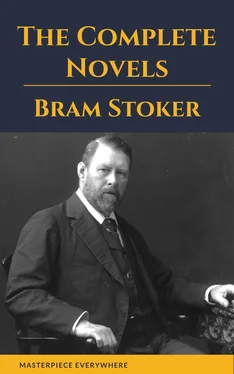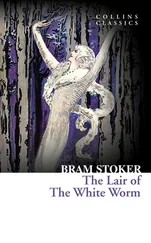Bram Stoker - Bram Stoker - The Complete Novels
Здесь есть возможность читать онлайн «Bram Stoker - Bram Stoker - The Complete Novels» — ознакомительный отрывок электронной книги совершенно бесплатно, а после прочтения отрывка купить полную версию. В некоторых случаях можно слушать аудио, скачать через торрент в формате fb2 и присутствует краткое содержание. Жанр: unrecognised, на английском языке. Описание произведения, (предисловие) а так же отзывы посетителей доступны на портале библиотеки ЛибКат.
- Название:Bram Stoker: The Complete Novels
- Автор:
- Жанр:
- Год:неизвестен
- ISBN:нет данных
- Рейтинг книги:3 / 5. Голосов: 1
-
Избранное:Добавить в избранное
- Отзывы:
-
Ваша оценка:
- 60
- 1
- 2
- 3
- 4
- 5
Bram Stoker: The Complete Novels: краткое содержание, описание и аннотация
Предлагаем к чтению аннотацию, описание, краткое содержание или предисловие (зависит от того, что написал сам автор книги «Bram Stoker: The Complete Novels»). Если вы не нашли необходимую информацию о книге — напишите в комментариях, мы постараемся отыскать её.
The Complete Novels :
The Primrose Path
The Snake's Pass
The Watter's Mou'
The Shoulder of Shasta
Dracula
Miss Betty
The Mystery of the Sea
The Jewel of Seven Stars
The Man
Lady Athlyne
The Lady of the Shroud
The Lair of the White Worm
Bram Stoker: The Complete Novels — читать онлайн ознакомительный отрывок
Ниже представлен текст книги, разбитый по страницам. Система сохранения места последней прочитанной страницы, позволяет с удобством читать онлайн бесплатно книгу «Bram Stoker: The Complete Novels», без необходимости каждый раз заново искать на чём Вы остановились. Поставьте закладку, и сможете в любой момент перейти на страницу, на которой закончили чтение.
Интервал:
Закладка:
“Katey, what do you mean by crying when I ask you a question? Have I done any wrong to you? Perhaps it would be better if I had died.”
Katey cried still more bitterly, and could only murmur as she laid her head on her husband’s shoulder —
“Oh, Jerry, Jerry. Oh, Jerry, Jerry.”
He put her aside with a motion rather of impatience than of unkindness. Katey did not distinguish the difference; with her head bent down she did not see his face, but merely felt the motion, and her sorrow turned into a wail.
“Oh, Jerry, Jerry, Jerry, Jerry, that ever the day should come when you should put me from you, and after all I’ve suffered. Oh-h-h, oh-h-h, oh-h-h,” and she moaned as one in dire pain.
Jerry threw himself back in his chair, and said, with a kind of desperation —
“Oh, go on, go on. Cry away, and make me and yourself miserable. Would to God I had died, and then you might have been more cheerful.”
Katey heard no more, she fainted.
Chapter 8 — Down the Hill
From that hour a cloud seemed to have settled between Jerry O’Sullivan and his wife. Katey did all in her power to atone for what seemed in Jerry’s eyes to be a piece of petulance, but which she knew to be the result of nervous weakness springing from protracted suffering and overwork. Jerry, as he got a little stronger too, got less petulant, and did not resist Katey’s advances, although there seemed to be still in his breast a sense of injury which took the outward expression of a kind of latent antagonism, specially galling to his wife. It was a good while before he was able to work; and neither his strength nor temper was improved by finding that during his illness his place at the theatre had been given away to another man. When he was able he called to the theatre, and after waiting for a long time, saw the manager, who coolly told him that of course he could not afford to pay two men for doing the same work, and so had been obliged to get another tradesman.
Jerry remonstrated, saying that he did not wish to take away any man’s bread, but that after all, fair play was fair play, and that as he had been injured in the theatre he thought he should be treated with some consideration, and be restored to his place which he had done nothing to forfeit. He was met with the answer, that a man must bear the risk and trouble of his own accidents on his own shoulders; that the manager had not been to blame in the matter; that Jerry had had the working of the machinery entirely under his own control, and that it was his own fault if anything went wrong.
Jerry felt that there was a soupqon of justice in this, and said no more. Indeed he did not get the chance of speaking, as the manager walked away. He did not know how the accident had occurred, for the idea of Mrs. Muldoon’s part in it never entered his head. He took it for granted that it was one of those accidents “which will occur,” and hard as was his lot, that he must put up with it.
He tried to get work in the neighbourhood, but there was then in London a strike in the building trade, and there was no work to be had. Day after day, Jerry walked for miles and miles, trying every place to get work, but all in vain. He had not yet recovered his strength, and so felt his efforts cramped, and consequently worried himself so much, and fretted so constantly, that both his health and his temper suffered.
Katey had much to bear. Since Jerry was earning nothing, she had to earn for all. She worked early and late, and grudged herself even a sufficiency of food that Jerry might have enough and so get stronger. She was always in good humour, and no matter what pain or sorrow was in her heart there was ever a loving smile to meet Jerry when either he or she returned home. Still she could not earn enough to buy sufficient food, and so the pawn-office was visited again and again, till the home was left well nigh empty.
At last Jerry, finding that no work at his trade could be obtained, made up his mind to do what he could. He tried to get work in different places and of different kinds, but, like many another poor fellow, he found that London is too full of hungry mouths for work to go long a-begging, and it seemed to him that his lot in life was to be for the future just too late to get anything he sought for. One day he thought he would try the theatre, for he knew work, though of poor kind, was sometimes to be got there. It was not without a mighty effort that he made up his mind to seek employment from the man who had superseded him, and whom in his heart he regarded bitterly as an usurper. The new man seemed to recognise and to reciprocate the hostility, and his manner to poor Jerry was extremely galling. He was happy to be able to show his own power by giving work to the other man, and by patronising him, or else he would have peremptorily refused. As it was he gave him some work, and even made a point of seeming to treat him differently from the other men who were doing the same work — a fact which made every one of them hate Jerry with the hatred of jealousy.
The little he now earned helped to banish the extreme want from the household, yet somehow all seemed now even more miserable than when dire cold and hunger stared them in the face. The cause was this. While cold and hunger, and dire misery were inmates of the house there was something to be borne — there was a sense of complete difference between the old circumstances and the present, altogether a sense that this through which they were passing was unreal — merely a crisis — and that the present evils must pass away in time. But now no such sense of contrast existed. Jerry was working as of old, and enough money was coming in to buy off the officers of the grim sheriff, Death. Jerry was working, indeed, but not in the old way. There was now neither hope nor ambition. To work was merely to toil ceaselessly to support existence that was a burden.
Jerry grew more and more despondent as the days wore on. Katey’s bright looks and hopeful words were now of no avail, and slowly and surely the conviction grew on her that sorrow, hopeless and overwhelming, was coming into their lives. Jerry began to feel, in all its force, how great had been his folly in leaving Dublin. Whilst he worked he kept thinking to himself, how different all would have been had he remained at home. Here sickness and trouble would have been his surest titles to the help and sympathy of his many friends; but in London, amid strangers where the maxim of life seemed to be sauve qui peut — a maxim which might be translated “Every man for himself — all was different, and to be down in the world was to be trampled upon.
Whenever he thought thus, there came to Jerry a fierce temptation to lose sight of his misery as other men lost sight of theirs — in that hell-cauldron, which is picturesquely termed “the bowl.” He resisted this temptation for a time, but he felt that his resolution was giving way. He would have returned to Dublin but for lack of means, and he had not yet fallen so low as to beg for assistance.
One day he was reprimanded in good round terms by his superior for some seeming fault. He answered temperately, and was told to “shut up.” He did shut up, for he felt that he dared not risk his present employment.
That day at dinner hour he went to Grinnell’s and drank recklessly. When a man who resists temptation for a time suddenly gives way to it, his fall is mighty. Jerry was unable to return to his work, and after a drunken sleep in the taproom was left at home in the evening still half stupefied.
Katey saw what had happened; and none can imagine her anguish save those who have known and felt some terrible sorrow — some sorrow where there was no thought of self. She did not wish for death, because she thought of her children; but too surely she saw that Jerry had been drinking to drown his care, and she knew that till the care disappeared — which could now only be at death — the remedy would be attempted again and again.
Читать дальшеИнтервал:
Закладка:
Похожие книги на «Bram Stoker: The Complete Novels»
Представляем Вашему вниманию похожие книги на «Bram Stoker: The Complete Novels» списком для выбора. Мы отобрали схожую по названию и смыслу литературу в надежде предоставить читателям больше вариантов отыскать новые, интересные, ещё непрочитанные произведения.
Обсуждение, отзывы о книге «Bram Stoker: The Complete Novels» и просто собственные мнения читателей. Оставьте ваши комментарии, напишите, что Вы думаете о произведении, его смысле или главных героях. Укажите что конкретно понравилось, а что нет, и почему Вы так считаете.












